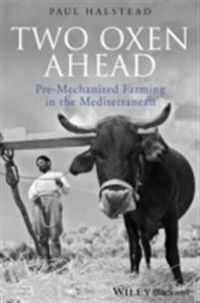
endast ny
Two Oxen Ahead Upplaga 1
TWO OXEN AHEAD This revealing study of farming practices in societies around the Mediterranean draws out the valuable contribution that knowledge of recent practices can make to our understanding of husbandry in prehistoric and Greco-Roman times. It reflects increased academic interest in the formative influence of farming regimes on the societies they were designed to feed. The author's intensive research took him to farming communities around the Mediterranean, where he recorded observational and interview data on differing farming strategies and practices, many of which can be traced back to classical antiquity or earlier. The book documents these variables, through the annual chaine operatoire (from ploughing and sowing to harvesting and threshing), interannual schemes of crop rotation and husbandry, and the generational cycle of household development. It traces the interdependence of these successive stages and explores how cultural tradition, ecological conditions, and access to resources shape variability in husbandry practice. Each chapter identifies ways in which heuristic use of data on recent farming can shed light on ancient practices and societies.
Upplaga: 1a upplagan
Utgiven: 2014
ISBN: 9781405192835
Förlag: John Wiley & Sons
Format: Häftad
Språk: Engelska
Sidor: 336 st
TWO OXEN AHEAD This revealing study of farming practices in societies around the Mediterranean draws out the valuable contribution that knowledge of recent practices can make to our understanding of husbandry in prehistoric and Greco-Roman times. It reflects increased academic interest in the formative influence of farming regimes on the societies they were designed to feed. The author's intensive research took him to farming communities around the Mediterranean, where he recorded observational and interview data on differing farming strategies and practices, many of which can be traced back to classical antiquity or earlier. The book documents these variables, through the annual chaine operatoire (from ploughing and sowing to harvesting and threshing), interannual schemes of crop rotation and husbandry, and the generational cycle of household development. It traces the interdependence of these successive stages and explores how cultural tradition, ecological conditions, and access to resources shape variability in husbandry practice. Each chapter identifies ways in which heuristic use of data on recent farming can shed light on ancient practices and societies.
Ny bok
1012 kr1065 kr
5% studentrabatt med Studentapan
Begagnad bok (0 st)
Varje vecka tillkommer tusentals nya säljare. Bevaka boken så får du meddelande när den finns tillgänglig igen.



